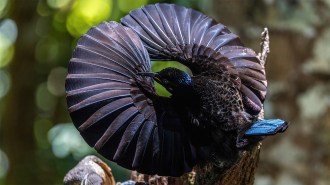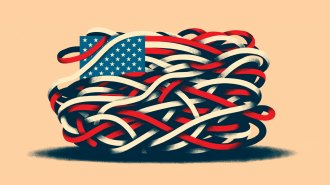Uncategorized
-
 Health & Medicine
Health & MedicineA new implant tested in animals reverses drug overdoses
In pigs, the device detected overdoses and administered naloxone. It could also alert emergency services to respond.
By Anna Gibbs -
 Archaeology
ArchaeologySilk Road cities reached surprising heights in Central Asia’s mountains
Drones with lasers revealed hidden urban centers that may have aided trade and travel through mountainous regions during medieval times.
By Bruce Bower -
 Tech
TechTech companies want small nuclear reactors. Here’s how they’d work
To fuel AI’s insatiable energy appetite, tech companies are going big on small nuclear reactors.
-
 Space
SpaceJWST spots the first known ‘steam world’
Astronomers have found a world shrouded in an atmosphere of water vapor, orbiting a star 100 light-years away.
-
 Health & Medicine
Health & MedicineOnce-weekly insulin might mean fewer shots for some with diabetes
Recent clinical trials of weekly insulin highlight how this formulation may be useful in managing diabetes, but the drug has limitations.
-
 Health & Medicine
Health & MedicineDoula care may lead to fewer C-sections or preterm births
A new study comparing the health outcomes of Medicaid patients with and without a doula suggests the extra support during pregnancy may be beneficial.
-
 Animals
AnimalsScience has finally cracked male riflebirds’ flirty secrets
New video upsets the old notion that these birds of paradise use wing clapping to make percussive sounds while courting.
By Susan Milius -
 Agriculture
AgricultureMegafire smoke may dampen California’s nut harvests
The summer after wildfire smoke blocked sunlight for long stretches, harvests at some almond tree orchards in California’s Central Valley dropped.
-

Taking the temperature of democracy
Editor in chief Nancy Shute discusses the science of studying democracies.
By Nancy Shute -

-
 Science & Society
Science & SocietyThe ‘Does It Fly?’ podcast separates fact from science fiction
The podcast ‘Does It Fly?’ asks whether the technology of Star Trek, Doctor Who and other popular sci-fi shows could really work.
-
 Science & Society
Science & SocietyIs U.S. democracy in decline? Here’s what the science says
Political scientists disagree over how to interpret a slight dip in the health of U.S. democracy.
By Sujata Gupta